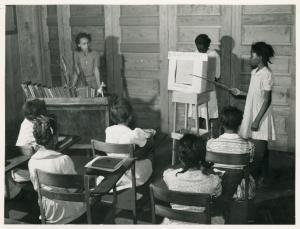Whew, I just finished reading Secretary Duncan's??meaty address to the faculty and students at Teachers College at Columbia University. It's a fairly brave speech by Education Secretary standards (despite the fact that he defines great teaching as "a daily fight for social justice").
Duncan calls out weak teacher prep programs and pushes them to better measure their success based on teacher outcomes:
....Simply put, incoming [college] freshmen don't know the content because too often they have been taught by teachers who don't know the content well. ......Now the fact is that states, districts, and the federal government are also culpable for the persistence of weak teacher preparation programs. Most states routinely approve teacher education programs, and licensing exams typically measure basic skills and subject matter knowledge with paper-and-pencil tests without any real-world assessment of classroom readiness. Local mentoring programs for new teachers are poorly funded and often poorly organized at the district level.Less than a handful of states and districts carefully track the performance of teachers to their teacher preparation programs to identify which programs are producing well-prepared teachers-and which programs are not turning out effective teachers. We should be studying and copying the practices of effective teacher preparation programs-and encouraging the lowest-performers to shape up or shut down.
...... Right now, Louisiana is the only state in the nation that tracks the effectiveness of its teacher preparation programs. Every state in the nation should be doing the same-and, as I said, we are going to provide incentives for states to do so in the $4.3 billion Race to the Top competition. It's a simple but obvious idea-college of educations and district officials ought to know which teacher preparation programs are effective and which need fixing. Transparency, longitudinal data, and competition can be powerful tonics for programs stuck in the past.
All well and good. But, there's even more for those of us who value teaching would-be teachers a strong body of content knowledge. Duncan gives a well-deserved pat on the back to E.D. Hirsch, Core Knowledge Founder. And then links Hirsch's unwelcome reception at his former education-school employer to a finding by Arthur Levine:
Ed school deans and faculty interviewed for Levine's study painted an unflattering picture of teacher education, which they complained was "subjective, obscure, faddish . . . out-of-touch, politically correct . . . and failed to address the burning problems in the nation's schools." English professor E.D Hirsch, the father of the acclaimed, content-rich Core Knowledge Program, got his own taste of the ideological blinders at colleges of education when he chose to teach an ed school course on the causes and cure of the achievement gap. Having authored the 1987 bestseller, Cultural Literacy, Hirsch anticipated that his course would be oversubscribed. But three years in a row, only 10 or so students enrolled. Finally, one of Hirsch's students informed him that other professors in the ed school were encouraging students to shun the course because it ran counter to their pedagogical beliefs.
This excerpt of the speech was of particular interest to me as I was a doctoral student at UVA when Dr. Hirsch taught there. I remember seeing his undergraduate course listed in the course directory and wondered how long the waiting list was to take it. I walked by his classroom door one afternoon, fully expecting to see students busting at the seams, and counted maybe 6 students in there. I learned later that his courses typically never had more than 10 students on a good day. Why? In short, he didn't have too many friends there. Most of the professors (including ones whom I served as a Teaching Assistant) weren't too fond of the Core Knowledge professor (he was "out-of-touch" with what teachers really needed to learn...) and they didn't hesitate to tell their own students that.
Sol Stern also wrote a fine new piece in the City Journal highlighting Hirsch's work and impact. In it, he quotes Hirsch: "That children from poor and illiterate homes tend to remain poor and illiterate is an unacceptable failure of our schools, one which has occurred not because our teachers are inept but chiefly because they are compelled to teach a fragmented curriculum based on faulty educational theories." Though I do indeed believe that some teachers are "inept," there is nonetheless a lot of truth to that statement.
I'm happy to see Secretary Duncan calling attention to a man who has done so much to shine a spotlight on the need for a content-rich curriculum in all of our schools.
If only the ed professors were listening.

